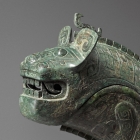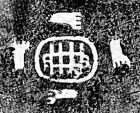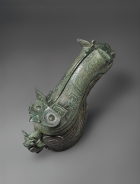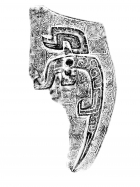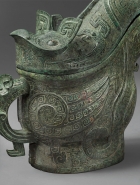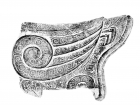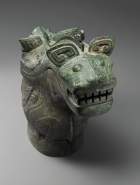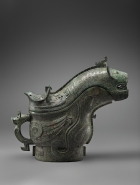J.J. Lally & Co., Oriental Art / New York City, New York
MenuPast Exhibition
Chinese Archaic Bronzes:
The Collection of Daniel Shapiro
March 14 - April 5, 2014
7.
GONG 觥
Shang Dynasty, 13th –12th Century B.C.
the deep boat-shaped vessel with wide, rising spout, fitted with an elongated cover ending in a stylized tiger head with ‘C’-scroll upright ears behind round bulging eyes and open jaws with blunt teeth and sharp fangs projecting beyond the end of the spout, the body of the tiger spread over both sides of the front half of the vessel, with short forelegs on either side of the neck, larger hind legs below, and a long tail ending in a tight curl on either side of the high hollow foot, the back of the cover cast with the head of an owl with hooked beak and large upright ‘C’-scroll feather-tufts behind round bulging eyes, the body of the owl forming the back of the vessel, with large wings in stepped relief swept back on either side and short legs ending in talons on the foot, the loop handle projecting at the back of the vessel, surmounted by a horned monster head above folded wings and a hooked terminal, the domed sides of the cover decorated with a pair of bodiless kui dragons cast in relief on a finely cast leiwen ground and divided by a notched flange down the center rising to a horned dragon head at the front and a hooked tail at the back, with another segmented flange bisecting the front of the vessel, flanked by intaglio kui dragons confronted beneath the lip of the spout and crested birds in intaglio on the tiger’s chest, the opposite end of the cover with a larger pair of confronted birds similarly cast below the owl’s beak, the details of the decoration all incorporated in a dense ground of varied allover fine intaglio scroll pattern, with brightly mottled malachite green patina, the center of the interior of the vessel with a pictogram.
Height 10 5⁄8 inches (27 cm)
Length 11 3⁄4 inches (29.8 cm)
The pictogram has been interpreted as 衛 (wei)—footprints around a sanctuary enclosing 冊 (ce)—two hands offering a book.
Provenance
From the Collection of Captain S. N. Ferris Luboshez, U.S.N. (1896–1984), acquired in China in 1948
Sotheby Parke Bernet, The Luboshez Collection Sale, New York, 18 November, 1982, lot 12
Swiss Private Collection, 1982–1996
J. J. Lally & Co., Early Dynastic China, New York, 1996, no. 44
Exhibited
Chinese Art from the Ferris Luboshez Collection, University of Maryland Art Gallery, 1972
Published
Chinese Art from the Ferris Luboshez Collection, University of Maryland Art Gallery, 1972, no. 10, fig. 16
The pair to this vessel, bequeathed to the Fogg Art Museum, Harvard University by Grenville L. Winthrop (1864–1943) is illustrated in Harvard University Art Museums: A Guide to the Collections, New York, 1985, p. 15, no. 5 and was previously illustrated in the Fogg Art Museum exhibition catalogue Grenville L. Winthrop: Retrospective for a Collector, Cambridge 1969, no. 35. The Winthrop gong is also published by Mizuno, Bronzes and Jades of Ancient China, Tokyo, 1959, pl. 54; Umehara, Inkyo (Yinxu, Ancient Capital of the Shang Dynasty at Anyang), Tokyo, 1964, pl. CXI; Willetts, Foundations of Chinese Art, London, 1965, pl. 84; Bagley, Shang Ritual Bronzes in the Arthur M. Sackler Collections, Cambridge, 1987, p. 414, fig. 73.2; and Sullivan, The Arts of China, London, 1984, (3rd edition), p. 26, no. 29.
Two gong of very similar form and design, discovered in the tomb of Fu Hao (d. circa 1200 B.C.), a favorite consort of the Shang emperor Wu Ding (r. 1250–1192 B.C.) are illustrated in Kaogu, 1977, No. 3, pl. 8, fig. 2 and in the excavation report, Yinxu Fu Hao mu (Tomb of Lady Hao at Yinxu in Anyang), Beijing, 1980, pl. 26:2.
The same distinctive pictogram found on this gong also appears on a Shang bronze wine container (you) in the Cernuschi Museum, illustrated by Elisseeff, Bronzes archaiques chinois au Musée Cernuschi, Vol. I, Paris, 1977, p. 134, no. 48.
商 觥 高 27 厘米 長 29.8 厘米
